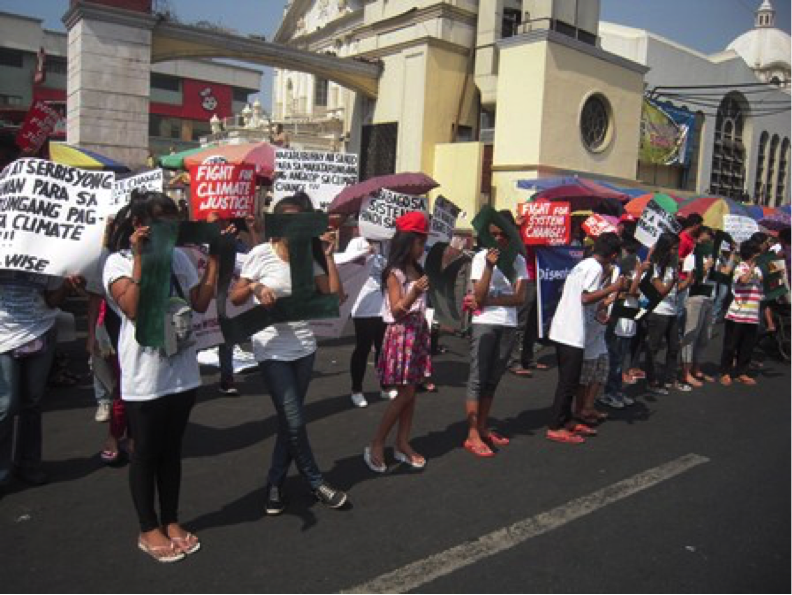On the Eve of Climate Agreement: Women, Workers, Urban Poor Groups Hold Protest To Demand Climate Justice; Belies Aquino’s Stance In The Paris Talks

On December 10, a few days away from the Paris Climate talks, women workers and urban poor communities gather at Plaza Miranda, Manila to demand climate justice and belie the Aquino government’s seeming strong stance in the ongoing talks.
“The Aquino government’s so-called leadership in the 21st Conference of Parties to the UN Framework Convention on Climate Change is a sham. While he speaks of an ambitious target of lowering greenhouse gas emissions and stemming average global temperature rise to below 1.5 degrees Celsius, his own backyard produces majority of energy from coal and is seen to increase its power production share to 60 percent,” says Daisy Arago, Executive Director of the labor NGO Center for Trade Union and Human Rights (CTUHR).
Groups that participated in protest action include the CTUHR, Kilusang Mayo Uno, Metal Workers Aliiance of the Philippines, Samahan ng Mamamayan para sa Hustisyang Pangklima (a network of urban poor community and workers organizations in Novaliches, Quezon City), We Govern Institute and Women Workers in Struggle for Employment, Empowerment and Emancipation (Women WISE3).
CTUHR also noted that the Aquino government has pursued policies that relentlessly allow destructive and extractive industries like mining and mono-crop plantations which not only destroy the environment further undermine mitigation efforts as well as the people’s capacity to adapt to climate-related disasters.
“Aquino’s subscription to neoliberal policies that deprives workers and urban poor communities of decent work, livelihood and social services combined with repeated disasters due to climate change push people deeper into poverty. Without addressing these issues of joblessness and poverty, it will impossible to build climate-change or disaster-resilient communities,” Arago averred.
Women, workers and the urban poor who have gathered are disaster survivors from several episodes of flooding in the Metro Manila area. They call for an alternative system that protects people, provides decent jobs, and just wages in place of current economic order that destroys the planet, exploits, oppresses, and puts them at risk.
“On the eve of a new climate agreement, women workers, the urban poor communities, and various grassroots stakeholders say that climate change is a human rights and social justice issue. The poor people should be at the front and center of such talks. What we need are real solutions and alternatives that will resolve the climate crisis. Big and rich countries should not be allowed to continue polluting at the same time profit from so-called climate smart technologies,” says Ms. Arago.###
